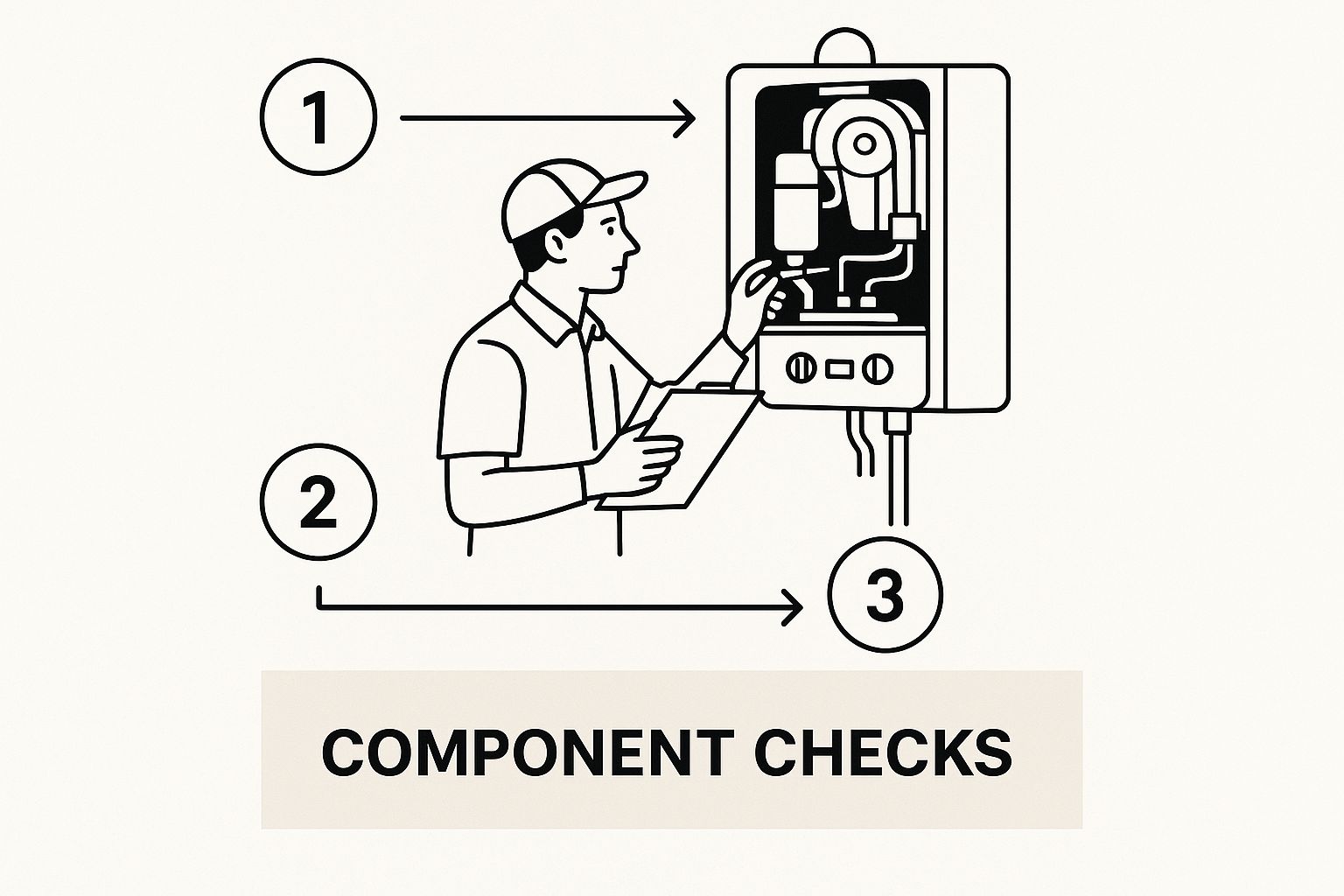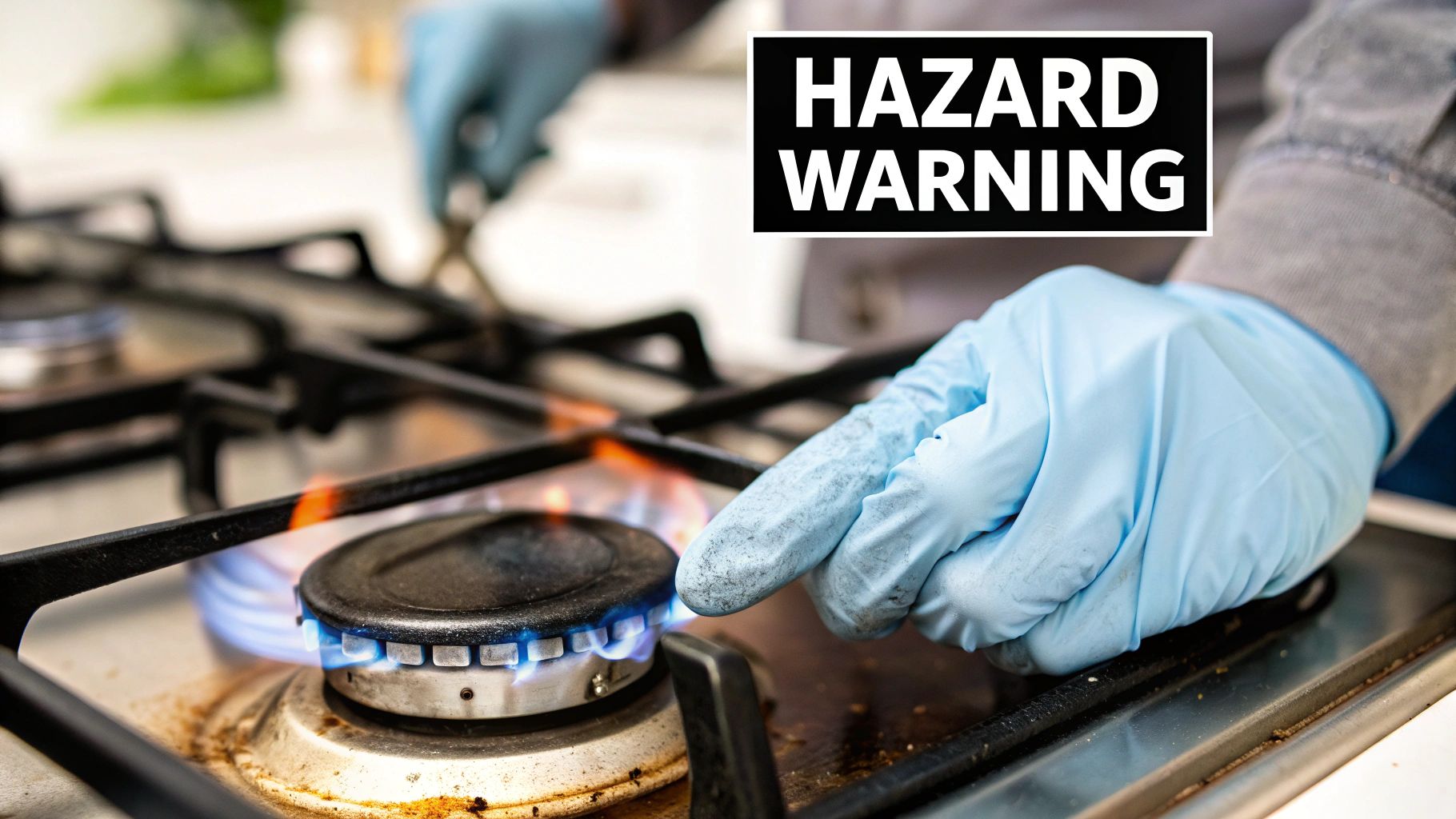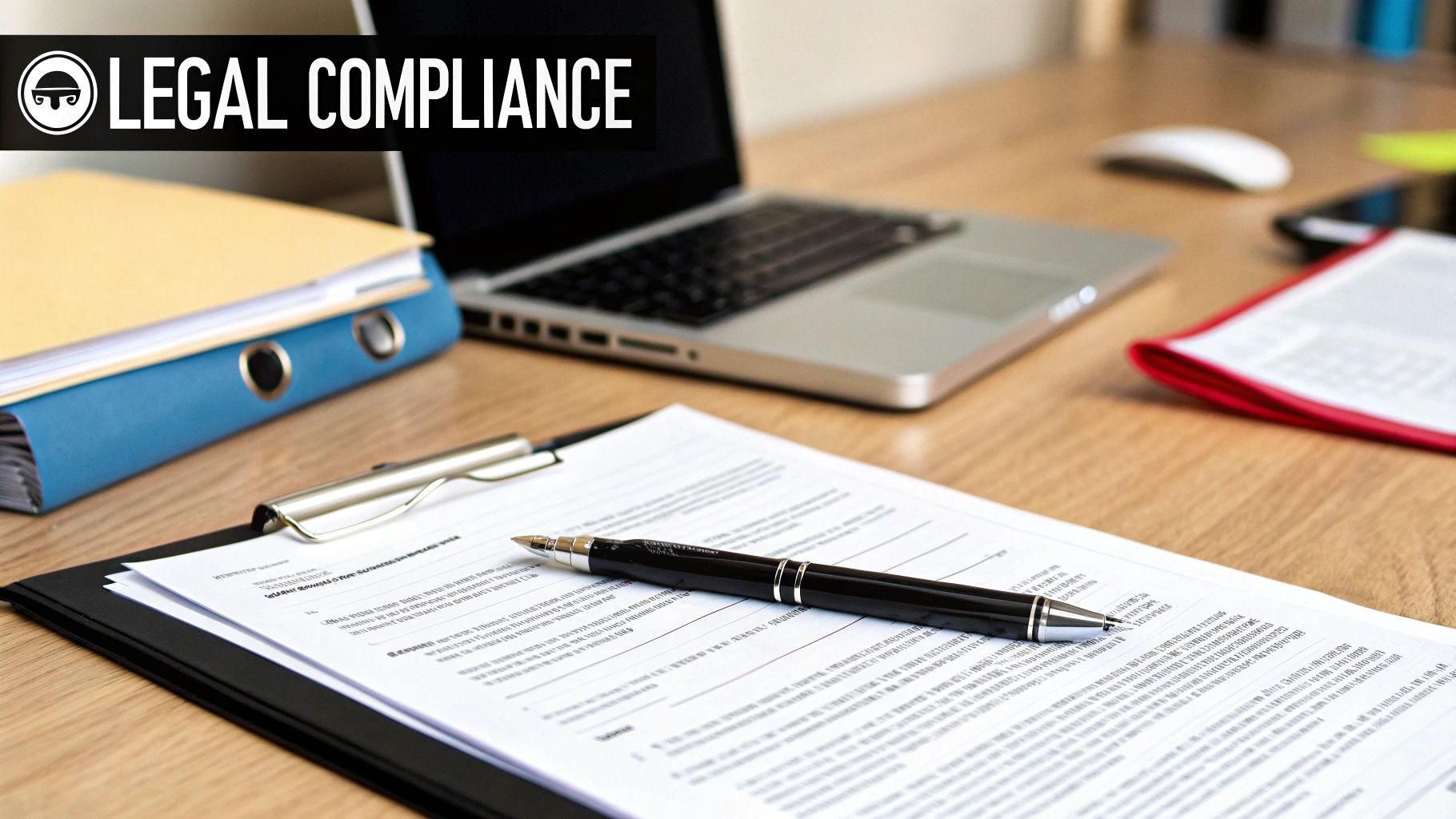Gas Safety Certificate What Is Checked: Complete Guide
- Luke Yeates
- Sep 12, 2025
- 10 min read
As a landlord, you've probably heard about the annual gas safety check, but what does it actually involve? Think of it as an MOT for your property's entire gas system. A Gas Safe registered engineer will meticulously inspect all your gas appliances, flues, and pipework to make sure everything is running safely and efficiently.
The engineer is looking for a few key things: gas tightness (no leaks!), correct operating pressures, proper ventilation, and ensuring that any nasty combustion byproducts are being safely removed from the property.
Understanding Your Gas Safety Obligations
For landlords across the UK, this annual check isn't just a suggestion—it's a legal requirement. It’s the single most important health check for your property's gas system, designed to protect your tenants from serious dangers like gas leaks and carbon monoxide poisoning. Here at Harrlie Plumbing and Heating, we see firsthand how these checks prevent potential disasters in Eastbourne properties every week.
The official document you'll get after the inspection is the Landlord Gas Safety Record, often referred to as a CP12 certificate. This certificate is your proof that a qualified professional has given your system a clean bill of health. These checks are surprisingly quick, usually taking around 30 minutes, though this can change depending on how many gas appliances you have.
Why Is This Check So Important?
Beyond ticking a legal box, this check is all about peace of mind. It’s a confirmation that every part of your gas system is working as it should, keeping your tenants safe.
A qualified engineer will verify three critical areas:
Appliance Safety: They’ll check that each gas appliance is burning correctly and not kicking out harmful fumes.
System Integrity: The engineer confirms there are no gas leaks anywhere in the pipework. This is a crucial one.
Proper Ventilation: They’ll make sure that flues and chimneys are clear, giving dangerous fumes a clear escape route outside.
A valid gas safety certificate is the cornerstone of responsible property management. It’s the most reliable way to show you’ve taken every necessary step to protect your tenants from gas-related hazards.
For landlords in Eastbourne, staying on top of this annual requirement is non-negotiable. It can feel like just another piece of admin, but understanding what’s being checked makes the process much clearer. To help you get to grips with it, we’ve put together a handy resource covering all the ins and outs. You can check out our guide on Eastbourne's annual gas safety check for more detailed information.
Checking the Foundation: Your Gas Meter and Pipework
Every gas safety inspection starts right at the source. Before an engineer even looks at your boiler or cooker, their first port of call is to examine the visible gas pipework and meter. They're looking for any signs of corrosion, damage, or dodgy installation that could compromise the whole system. Think of it as checking the foundations of a house – everything else relies on it being solid.
The most critical part of this initial check is the gas tightness test. It’s a bit like checking a bicycle tyre for a slow, invisible puncture. Using a special calibrated pressure gauge, the engineer confirms that absolutely no gas is escaping anywhere between the meter and your appliances, no matter how tiny the leak.
This visual inspection and test are vital. For instance, in a classic Victorian terrace in Eastbourne's Old Town, one of our Harrlie Plumbing and Heating engineers might find old lead pipework. While not immediately dangerous, it needs to be flagged on the certificate straight away so the landlord is aware. It just goes to show how crucial this first step is for keeping tenants safe.
This infographic shows a Gas Safe engineer carrying out the essential checks that form the core of the inspection.

As the image highlights, a thorough check is a multi-step process. It always begins with the pipework before the engineer can safely move on to the individual appliances.
Key Focus Areas for Pipework and Meter
During this stage, the engineer has a sharp eye out for several specific things to make sure the system is not only safe but also up to current standards.
Pipework Condition: Is there any physical damage, rust, or are the pipes properly supported? Anything that looks like it could fail down the line will be noted.
Emergency Control Valve: The engineer will check that the main gas valve is easy to get to and works properly. You need to be able to shut the supply off fast in an emergency.
Meter Installation: The meter itself is checked to see that it’s secure and hasn’t been tampered with or damaged.
A successful tightness test is the first crucial piece of evidence that your gas installation is secure. If the system fails this test, an engineer cannot safely proceed to check the individual appliances. It’s a non-negotiable part of what is checked for a gas safety certificate.
Right, so once the main gas pipework gets the all-clear, the engineer's attention turns to the individual appliances dotted around your property. This is where the inspection gets really granular. Every single appliance, from your trusty boiler to the gas hob and any decorative fires, is put through its paces to make sure it’s running safely and efficiently.
You can think of it as a specific health check for each piece of kit. For a modern combi boiler in a new Sovereign Harbour apartment, a Harrlie Plumbing and Heating engineer will be checking that the burner pressure and gas rate are spot on. This is crucial—it ensures the boiler isn't guzzling too much gas, which is not only inefficient but can also be dangerous.
On the other hand, an older, decorative gas fire in a charming Meads village cottage might need a slightly different approach, but the core safety principles are exactly the same. The engineer will check it's stable, securely connected, and fires up without any issues.
What We Check on Each Appliance
The whole process is methodical, covering every angle of an appliance's operation. Take a gas hob, for example. One of the most important tests is on the flame failure devices. These are brilliant little safety features designed to automatically shut off the gas if a flame blows out, stopping a dangerous gas leak in its tracks.
An engineer's checklist is comprehensive. They'll do everything from a visual once-over of the installation to verifying that appliances are correctly located and flues are routed properly. They also test burner pressure, check all the safety controls, and carry out flue spillage tests to ensure everything is working as it should. If you're curious, you can read more about the detailed scope of these appliance checks to see just how thorough it is.
This meticulous approach is applied to every single gas appliance you have.
Boilers: We check for the correct gas pressure, safe ignition, and that the gas is burning cleanly and efficiently.
Gas Hobs & Cookers: Flame failure devices are tested, and we check every burner for a stable, crisp blue flame.
Gas Fires: These are inspected for stability and proper ventilation, and we make absolutely sure no soot or dangerous fumes are being produced.
A huge part of what is checked for a gas safety certificate is simply confirming that each appliance isn't just working, but working safely—both to the manufacturer's standards and current regulations. This is what protects your tenants from unseen dangers like carbon monoxide poisoning.
At the end of the day, it doesn't matter if it's a state-of-the-art heating system or a simple gas cooker. Our engineers in Eastbourne apply the same strict standards across the board. Every appliance must pass these tests before we can sign off on the property, making sure your legal duties as a landlord are completely covered.
Verifying Safe Flue Performance and Ventilation
Think of your gas appliance's flue as its exhaust pipe. Just like a car, it needs a clear and safe way to get rid of harmful waste gases. This is a critical part of the gas safety check, focusing on two invisible but essential elements: a steady supply of fresh air for the appliance to 'breathe' and a clear exit path for the fumes it creates.
Our engineers need to be absolutely sure that dangerous combustion products, especially carbon monoxide, are being channelled safely outside your property and not lingering indoors.

To do this, we perform a flue spillage test. This involves using a smoke match or a sophisticated digital flue gas analyser right at the appliance's draught diverter. The test quickly shows us if all the fumes are being drawn up the flue correctly or if they're spilling back into the room. A failure here is a serious red flag that requires immediate attention.
Checking Air Supply and Ventilation
Just as important as getting the bad air out is getting enough good air in. Gas appliances need a constant supply of oxygen to burn fuel cleanly and efficiently. Without it, the combustion process becomes incomplete, and the appliance can start churning out lethal carbon monoxide.
This is why the engineer will meticulously check for adequate ventilation. It's particularly crucial in smaller rooms or modern, well-sealed homes where airflow might be restricted.
Air Vents and Bricks: We inspect any purpose-built air vents to ensure they’re the right size and, most importantly, completely clear.
Room Size: The engineer calculates the room's volume against the appliance's power output to make sure it meets strict safety regulations.
Obstructions: We’ll look for anything that could block vital airflow – a surprisingly common and dangerous oversight.
For example, a Harrlie Plumbing and Heating engineer inspecting a student rental near Eastbourne Pier might discover an air vent has been blocked by furniture to stop a draught. This is a common issue that this check is specifically designed to catch and rectify immediately.
This part of the inspection is fundamental. It ensures the invisible processes of combustion are happening safely, protecting tenants from the silent threat of carbon monoxide poisoning. An appliance can look perfect on the outside, but without the right flue performance and ventilation, it can become incredibly dangerous.
Making Sense of Your Gas Safety Certificate
Once your Gas Safe engineer has finished their inspection, they'll hand over the Landlord Gas Safety Record, often known as a CP12 certificate. It might look like just another piece of paperwork, but knowing how to read it is a huge part of understanding what’s checked for a gas safety certificate. Think of it as the official report card for your property's gas health.
The certificate will clearly list the essentials: the property address, the inspection date, and your details as the landlord. More importantly, it will show the engineer's name and their unique 7-digit Gas Safe Register ID number. It's always a good idea to double-check this number online to confirm they are qualified and registered.
Understanding the Codes: What Do They Mean?
The real meat of the report is the section detailing the appliances checked and the results. You'll see codes that classify the state of each appliance, and getting to grips with these is crucial for knowing what to do next.
Immediately Dangerous (ID): This is the red alert. It means an appliance is a direct threat to life and safety. The engineer must, with your permission, disconnect the gas supply to it on the spot.
At Risk (AR): This code flags a fault that has the potential to become dangerous. Your engineer will strongly advise you not to use the appliance until it's been fixed. For example, a boiler with poor ventilation in a flat near Hampden Park would fall into this category.
Not to Current Standards (NCS): This simply means the appliance or installation is safe to use but doesn't meet the latest regulations. It’s a recommendation to upgrade when you can, but it doesn't require you to take immediate action.
These codes aren't just jargon; they empower you to act quickly and protect your tenants. It’s not about ticking a box and filing the certificate away. It’s about actively managing the safety of your Eastbourne property.
By taking a few minutes to familiarise yourself with these details, you can be confident that you're not just legally compliant but also fully aware of your property's gas safety status. For a more detailed look, you can learn more in our [essential guide for landlords on gas safety certificates](https://www.harrlieplumbing.co.uk/post/what-is-gas-safety-certificate-essential-guide-for-landlords).
Common Gas Safety Questions Answered

We get it. The world of gas safety can feel a bit confusing, especially for landlords managing properties in and around Eastbourne. To clear things up, we've pulled together some of the most common questions our engineers at Harrlie Plumbing and Heating hear every day. Here are the clear, practical answers you need to stay compliant and confident.
What's the Difference Between a Gas Safety Check and a Boiler Service?
This is a classic, and it’s a great question. Think of a gas safety check (your CP12 certificate) like a car's MOT. Its sole purpose is to confirm that your gas appliances are operating safely and meeting the legal minimum requirements. No more, no less.
A boiler service, on the other hand, is like a full vehicle service and tune-up. It's a much deeper dive where an engineer cleans out the internal gunk, fine-tunes the performance, and flags any worn parts before they fail. While some checks overlap, a service is all about proactive health and efficiency, whereas the gas safety check is purely about ticking the legal safety box.
How Long Is a Gas Safety Certificate Valid?
Your gas safety certificate is valid for exactly 12 months from the date of the inspection. As a landlord, it’s your responsibility to get a new check done before the current one runs out. This ensures you’re always legally covered.
To make life easier, the rules give you a bit of wiggle room. You can have the inspection carried out up to two months before the expiry date without changing your original renewal date. This flexibility is a huge help for landlords trying to avoid any last-minute panic or accidental gaps in cover.
What Happens If an Appliance Fails the Check?
If one of our Harrlie Plumbing and Heating engineers finds a fault during a check at your Eastbourne property, what happens next depends entirely on how serious it is.
If an appliance is labelled 'Immediately Dangerous' (ID), it means it poses a direct threat to safety. The engineer must, with your permission, disconnect it from the gas supply on the spot.
If it’s classed as 'At Risk' (AR), a fault exists that could become dangerous over time. In this case, the engineer will turn it off and strongly advise you not to use it until it's fixed. For both ID and AR situations, you are legally required to get the problem sorted by a Gas Safe registered engineer before the appliance can be used again.
What Are My Responsibilities for Tenant Access?
As the landlord, it’s down to you to make sure the Gas Safe engineer can actually get into the property to do the check. The law says you must give your tenants at least 24 hours' written notice before any visit.
Good communication is your best friend here. We always find it’s best to coordinate a time that works for both your tenant and the engineer. It’s also a smart move to keep a record of all your attempts to gain access, just in case any disputes pop up later. Knowing the full process is helpful, and you can learn more about how long a gas safety check takes in our detailed article.
At Harrlie Plumbing and Heating, our Gas Safe registered engineers are ready to handle all your gas safety needs, from the annual check to urgent repairs. Make sure your Eastbourne property is safe and compliant by booking with a local expert you can trust. Contact us today for a free quote and complete peace of mind.

Comments